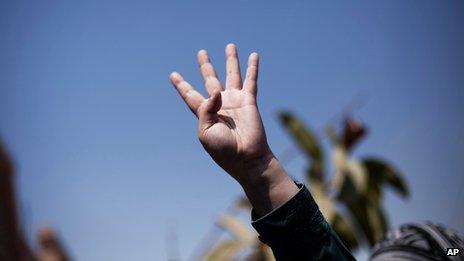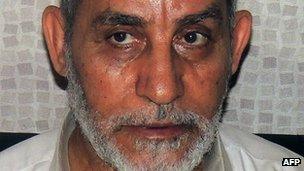What now for the Muslim Brotherhood?
- Published

Will the Muslim Brotherhood and its supporters be forced underground again?
The Egyptian government has had to react fast to events over the last few days and it now appears they had no prior strategy about what to do with the Muslim Brotherhood as an organisation at this stage.
Initially their position was that they welcomed dialogue with the Brotherhood and it was conceivable that in time they could even be allowed back into government, as long as they did not have blood on their hands.
But under pressure from the Egyptian media, this position appears to have hardened. Foreign intervention has complicated the situation further, as any sign of leniency on the part of the government is now seen as caving in.
In recent days the government has indicated the Brotherhood will be banned and on Monday the Egyptian authorities were quoted as saying the Freedom and Justice Party - the political wing of the Brotherhood - will have its licence to operate as a political party revoked, which in effect will dissolve it.
Such a ban would satisfy many Egyptians who view the Brotherhood as a fascist terrorist organisation. It would also force the Brotherhood back underground, where it used to be.
Unfortunately this would likely turn out to be a mistake, as history shows the Brotherhood is easier to deal with when it is above ground and involved in the political process, rather than below ground cultivating links to more radical groups.
'Ideal tool'
Currently the government is embarked on a massive crackdown on the Brotherhood. Thousands have been arrested, including all the senior leadership except Mohammed al-Beltagi and Essam el-Erian, whose whereabouts are unknown. The organisation's finances have been frozen, its funding cut and media outlets shut down.

Mohamed Badie, the Brotherhood's general guide, was arrested on Tuesday
Eradication, however, is not an option. In the past there have been many attempts to contain and reduce the Brotherhood, most notably by former President Gamal Abdul Nasser, who was much more popular and powerful than Gen Sisi. But the Brotherhood's pan-Arab ideology and belief in transforming society according to their interpretation of Islam proved hard to rub out and the organisation quickly revived after his death.
Nor can the Brotherhood be expected just to give up. Religiously motivated, their supporters seek revenge and harbour a strong sense of grievance at how they have been treated.
The takeover has made them the symbol of injustice at the hands of the "deep state". Many Islamists who used to be hostile or uninterested in the Brotherhood before the coup now support them, believing they are all now enemies of the new military-backed government.
Though it has produced many other extremist organisations, the Brotherhood itself renounced violence decades ago.
For years the Brotherhood avoided violence and operated like any other peaceful political organisation. Their leadership acquired a reputation for being tightly disciplined and in control.
But in the last six weeks, Egyptian media and the internet have been full of images of Brotherhood supporters carrying weapons and shooting at people in the centre of Cairo and other major cities.
What brought about this apparent change in policy and prompted the Brotherhood to take a stand over the ousting of President Mohammed Morsi is not clear. Some say the guide's office (the leadership) was taken over by extremists or that they lost control of the grassroots.
The Brotherhood is organised in a pyramidal structure, and with so many arrested and killed, it is likely that now the organisation will start to break down - in which case the leadership will no longer be able to exercise control over its followers or convince them to abandon violence.
Many Brothers might start soon to defect to jihadist groups, especially if the military-backed government fails to quickly deliver the demands of the revolution, leading to a return to the kind of terrorism Egypt has experienced on and off since 1971 - against military targets, state institutions, tourists and political leadership.
Weapons are easy to come by in Egypt nowadays, from both Libya and Sinai.
Meanwhile the government is using all means available to portray the Muslim Brotherhood as a terrorist group and they have helpfully provided many videos as evidence.
As with previous military regimes, those behind the coup are finding the Brotherhood the ideal tool to justify their past acts as well as any other action they take henceforth, and when force has been used on such a massive scale, a proportionate threat needs to be found.
Hugh Miles is a writer and journalist living in Cairo. His books include Al-Jazeera: How Arab TV News Challenged the World and Playing Cards in Cairo.